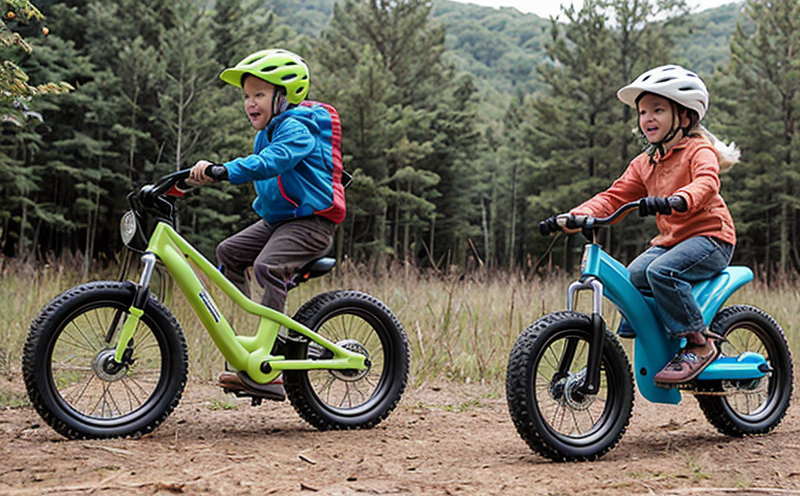EN 71-1 Ride-on Toy Labeling and Instruction Compliance
The European Standard EN 71-1 is one of several parts that make up the comprehensive safety requirements for toys. Specifically, it deals with mechanical and physical properties, as well as chemical safety aspects relevant to ride-on toys. This service focuses on ensuring compliance with the labeling and instruction requirements outlined in EN 71-1 for ride-on toys.
Ride-on toys encompass a wide range of items including bicycles, scooters, skateboards, and any other wheeled devices designed primarily for children under the age of 14 years. These toys represent significant potential hazards due to their mobility and interaction with various environments. Compliance with EN 71-1 ensures that these toys are safe not only during use but also in packaging and accompanying instructions.
Labeling requirements under EN 71-1 mandate the inclusion of specific information on the toy itself, its packaging, and any related documentation provided to consumers. This includes warnings about potential hazards, age suitability statements, and instructions for safe usage. Proper labeling is crucial as it informs parents and guardians about the appropriate use and maintenance of these toys.
The instructions must be clear, concise, and written in a language that the intended audience can understand easily. They should cover all aspects of proper assembly, operation, and disassembly if applicable. Additionally, they need to highlight any risks associated with improper handling or misuse of the toy. By adhering strictly to these guidelines, manufacturers ensure not only legal compliance but also enhance consumer confidence in their products.
Compliance testing involves several steps including review of existing documentation, inspection of physical specimens, and sometimes additional assessments depending on specific circumstances. Our team uses state-of-the-art facilities equipped with specialized tools necessary for accurate measurement and evaluation against the standard's requirements. We employ rigorous procedures to ensure that each product meets all specified criteria before certification can be issued.
For instance, during the review stage, our experts carefully examine all provided documentation such as assembly diagrams, parts lists, user manuals, etc., ensuring they meet the necessary linguistic and format standards set forth by EN 71-1. Physical inspections focus on verifying correct placement of warning labels, appropriate language used in instructions, and clarity regarding safety precautions.
When necessary, we may conduct further evaluations using advanced equipment like spectrophotometers to check colorfastness properties or other specialized apparatus required for particular tests. Once all aspects have been thoroughly checked and approved, a comprehensive report summarizing findings will be issued along with recommendations for improvement where needed.
This service plays an essential role in safeguarding children against accidental injuries caused by poorly designed or improperly labeled ride-on toys. By offering this specialized compliance testing, we contribute significantly towards maintaining high standards within the industry.
Why Choose This Test
Selecting EN 71-1 Ride-on Toy Labeling and Instruction Compliance testing services offers numerous advantages for toy manufacturers. Firstly, it ensures that your products meet stringent European safety regulations, thereby protecting children from potential dangers associated with unsafe toys.
- Enhanced Reputation: Demonstrating compliance enhances brand reputation among parents seeking reliable product choices for their kids.
- Legal Protection: Compliance reduces liability risks by minimizing the chances of lawsuits resulting from accidents involving your products.
- Market Access: Meeting these standards increases market access opportunities both within Europe and internationally, as many countries adopt similar safety guidelines.
- Consumer Confidence: Clear labeling and detailed instructions foster trust between brands and consumers, leading to increased sales and customer loyalty.
Moreover, this service helps identify potential issues early in the development process through thorough inspections and evaluations. This proactive approach allows for necessary adjustments before mass production begins, saving time and resources while improving overall quality.
By choosing our EN 71-1 compliance testing services, you demonstrate commitment to child safety and regulatory adherence, ultimately contributing to a safer environment for all users of ride-on toys.
International Acceptance and Recognition
- European Union: EN 71-1 is mandatory in the European Union, ensuring that toys sold within this region comply with strict safety requirements.
- Brazil: Brazil has adopted similar standards to ensure imported toys meet local safety expectations.
- United States: While not directly adopting EN 71-1, U.S. regulations often align closely with its provisions for toy safety.
- China: China's national toy safety specifications also incorporate elements similar to those found in EN 71-1, making compliance beneficial even beyond Europe.
- Australia and New Zealand: The Australasian Harmonized Standard (AS/NZS) for toys includes provisions that are consistent with EN 71-1, promoting international harmonization.
- Japan: Japan has its own rigorous toy safety standards which, although different from EN 71-1, emphasize comparable aspects of child protection.
The widespread adoption of these standards across various regions highlights the importance of meeting EN 71-1 requirements for global market expansion. By ensuring compliance with this standard early in product development, toy manufacturers can confidently enter multiple markets without having to undergo separate certifications or face potential barriers due to non-compliance.
Environmental and Sustainability Contributions
In addition to promoting child safety, EN 71-1 also indirectly contributes positively towards environmental sustainability. By mandating clear labeling and detailed instructions regarding proper use and care of toys, the standard helps reduce waste by encouraging users to maintain products longer.
The emphasis on durability in toy design underpins this contribution. Toys that last longer are less likely to end up in landfills prematurely. Moreover, the focus on recyclability aspects within EN 71-1 encourages manufacturers to consider eco-friendly materials and processes during production.
Compliance with these regulations fosters a culture of responsible consumption by educating consumers about how they can contribute positively to environmental preservation through proper toy usage and disposal practices. Thus, beyond immediate safety benefits, adherence to EN 71-1 plays a crucial role in advancing sustainable development goals relevant to the toy industry.





